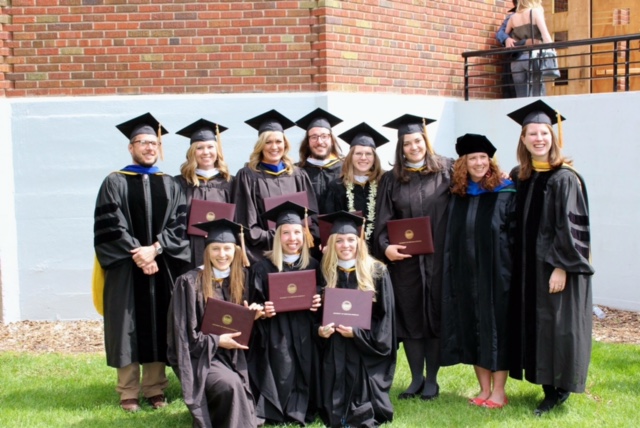Specialist in School Psychology (SSP)
The Specialist in School Psychology (SSP) Program follows the scientist-practitioner model in which an understanding of empirical research and theory influences the school psychologist’s best practice in service delivery. The UM School Psychology Program provides a planned sequences of courses in school psychology in addition to practica and internship experiences. The SSP Program is approved by the National Association of School Psychologists (NASP), and the scope and sequence of the program is aligned with NASP standards. Students in the program receive the training necessary to become both a Class 6 License in School Psychology, as well as a Nationally Certified School Psychologist (NCSP)
Through our strong commitment to a scientist-practitioner model, the Specialist in School Psychology Program provides comprehensive training through coursework and clinical training. The SSP Program requires approximately 69 credit hours and entails a three-year course of study. The first two years consist of full-time coursework and school-based practica experiences. During the third year, students will complete a one-year internship in a school setting. Students must also pass a written comprehensive examination at the end of their second year on campus.
Students in the School Psychology Program also have a number of opportunities to develop their clinical skills with children and their families. Practicum course seminars focus on professional and ethical issues, as well as skills and knowledge of assessment, treatment/intervention, and consultation. The program emphasizes the development of cultural competence skills to effectively work with children and families from culturally and linguistically diverse backgrounds. Emphasis is also placed on promoting a student’s strengths and supporting all students through the problem-solving model and Response to Intervention (RTI).
Through both school-based and clinic-based practica, school psychology SSP students have the skills and knowledge to work with children and their families, school professionals, and school systems. Further information about the training program can be found on our Curriculum page.
Mission Statement
Our mission is consistent with that of the National Association of School Psychologists: to promote educationally and psychologically healthy environments for all children and youth by implementing research-based, effective programs that prevent problems, enhance independence and promote optimal learning. The University of Montana School Psychology Program values and respects human diversity, defined as the rich spectrum of human differences in culture, physical and cognitive characteristics, family configuration, sexual orientation, socioeconomic status, and exceptionalities. We work together to produce and disseminate knowledge in our field that supports the long-term well-being of our diverse society.
Funding Opportunity with the Office of Public Instruction
The Montana Office of Public Instruction (OPI) has a goal to address shortages of school psychologists in the state of Montana. As a result, OPI offers a stipend opportunity to offset graduate education costs for Educational Specialist students. Specifically, Ed.S. students can receive up to $6000 per year towards their instructional costs (usually used for tuition). Students payback the stipend through serving as a School Psychologist within the state of Montana for two out of three years, post-degree. The stipend opportunity offers an exceptional opportunity to help our students with costs of schooling. Please contact a faculty member for more information about this opportunity.

Top 5 Reasons to Attend the UM School Psychology Program
- You have an interest in conducting assessments, intervention/therapy, and consultation in a variety of settings, including schools and clinics, starting in your first year in the program.
- You have an interest in working with faculty having a diverse range of clinical and research expertise, including bullying prevention, culturally responsive evidence-based practices, crisis prevention, among others.
- You have an interest in working with children and family from rural and tribal communities.
- You have an interest in being trained within a psychology department, taking core classes taught by clinical and experimental psychologists, and collaborating with students and faculty in other areas of psychology.
- You have an interest in living in a vibrant place with an abundance of outdoor activities. Missoula has consistently been listed as one of the best places to live for outdoor enthusiasts.
Please check out UM’s School Psychology Program’s video for more information about the wonderful opportunities you will receive as a student in our program. For more reasons to come to Montana, please watch this video on school psychology in Montana from Alum Kristine Schoen, SSP (School Psychologist in Anaconda, Montana), which was developed for the SchoolPsyched Podcast series.
